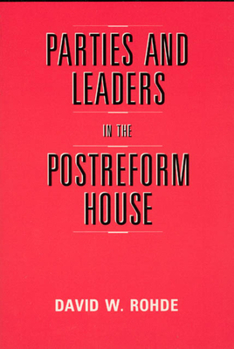Parties and Leaders in the Postreform House
(Part of the American Politics and Political Economy Series)
Select Format
Select Condition 
Book Overview
Since the Second World War, congressional parties have been characterized as declining in strength and influence. Research has generally attributed this decline to policy conflicts within parties, to growing electoral independence of members, and to the impact of the congressional reforms of the 1970s. Yet the 1980s witnessed a strong resurgence of parties and party leadership--especially in the House of Representatives. Offering a concise...
Format:Paperback
Language:English
ISBN:0226724077
ISBN13:9780226724072
Release Date:August 1991
Publisher:University of Chicago Press
Length:239 Pages
Weight:0.80 lbs.
Dimensions:0.6" x 6.1" x 9.1"
Customer Reviews
1 rating
Congressional Evolution
Published by Thriftbooks.com User , 14 years ago
Rhode (1991) rejects the idea (as posed by Epstein 1986 and others) that the power of party leadership and party cohesion are on the decline. Rather, Rohde contends that we have seen - since the 1980s - an increase in party cohesion and partisanship in the House. In addition, Rohde's argument would call into question candidate-centered elections in which candidates vote with the constituency over the party (Fiorina 1989; Kingdon 1992). Rhode contends that between 1887 and 1968, we saw a decline in partisanship and a weakening of parties in the House. During this period committee chairs held a tremendous amount of power to enforce their policy preferences regardless of the wishes of the party leadership and the rank-and-file. However, during the 1960s there was an increase in the number of liberal Democrats. Their views contradicted the views of the old conservative Democrats. Although the liberal policies of the new Democrats were supported by the majority of the party, their proposals were killed by the negative power of the old conservative Democrats holding committee chairs based on seniority. In the 1970s, a new reform era emerged to ensure that the policy preferences of the party majority weren't suppressed by the few party committee chairs. The reforms consisted of three tracks. First, the Democratic Studies Group (DSG) implemented reforms to limit the powers of the chair by removing the sonority system, removing the chairs' power to appoint subcommittee chairs, allowing a majority of committee members to vote to bring a bill directly to the floor, make votes on bill amendments take the form of roll call votes, etc. Second, reformers increased the strength of party leadership by granting powers to appoint members to the steering committee, allowing for the adoption of multiple referrals, etc. Third, in order to serve as a check on party leaders, reformers increased the power of the caucus composed of rank-and-file party members. Leaders who violated or blocked the policy preferences of the party majority would be removed. As the Democrats became more cohesive, many more bills were being passed, and many more rules were enacted which benefited the party. This was furthered by the increased power of the Speaker to mitigate conflict between members, and use the expanding whip system to increase communication and partisanship between leaders and rank-and-file members. This increased Democratic cohesiveness made them a powerful force and severely frustrated the Republican Party. Ultimately, the GOP chose to adopt many of the same organizational strategies as the Democrats to improve their own party cohesion and overall strength. In regards to legislative consequences, Rohde writes, "The combination of greater homogeneity in both parties based on changing electoral conditions, and the employment of institutional powers to buttress that homogeneity and advance party-favored initiatives, created the context for the operation o





